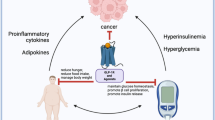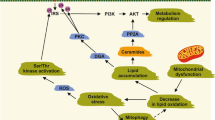
Similar content being viewed by others
References
Ogden CL et al. (2006) Prevalence of overweight and obesity in the United States, 1999–2004. JAMA 295: 1549–1555
Giovannucci E et al. (2007) Risk factors for prostate cancer incidence and progression in the health professionals follow-up study. Int J Cancer 121: 1571–1578
Dahle SE et al. (2002) Body size and serum levels of insulin and leptin in relation to the risk of benign prostatic hyperplasia. J Urol 168: 599–604
Zeng Y et al. (2008) Gene expression profiles of lysophosphatidic acid-related molecules in the prostate: relevance to prostate cancer and benign hyperplasia. Prostate 69: 283–292
van Meeteren LA and Moolenaar WH (2007) Regulation and biological activities of the autotaxin–LPA axis. Prog Lipid Res 46: 145–160
Saulnier-Blache JS (2006) Secretion and role of autotaxin and lysophosphatidic acid in adipose tissue. J Soc Biol 200: 77–81
Mills GB and Moolenaar WH (2003) The emerging role of lysophosphatidic acid in cancer. Nat Rev Cancer 3: 582–591
Boucharaba A et al. (2006) The type 1 lysophosphatidic acid receptor is a target for therapy in bone metastases. Proc Natl Acad Sci USA 103: 9643–9648
Yang M et al. (2005) G protein-coupled lysophosphatidic acid receptors stimulate proliferation of colon cancer cells through the β-catenin pathway. Proc Natl Acad Sci USA 102: 6027–6032
Hao F et al. (2007) Lysophosphatidic acid induces prostate cancer PC3 cell migration via activation of LPA1, p42 and p38α. Biochim Biophys Acta 1771: 883–892
Daaka Y (2002) Mitogenic action of LPA in prostate. Biochim Biophys Acta 1582: 265–269
Sakamoto S et al. (2004) Increased expression of CYR61, an extracellular matrix signaling protein, in human benign prostatic hyperplasia and its regulation by lysophosphatidic acid. Endocrinology 145: 2929–2940
Sciarra A et al. (2008) Prostate growth and inflammation. J Steroid Biochem Mol Biol 108: 254–260
D'Aquilio F et al. (2007) Activatory properties of lysophosphatidic acid on human THP-1 cells. Inflammation 30: 167–177
Osterud B and Bjorklid E (2003) Role of monocytes in atherogenesis. Physiol Rev 83: 1069–1112
Shimizu H et al. (1991) Cancers of the prostate and breast among Japanese and white immigrants in Los Angeles County. Br J Cancer 63: 963–966
Tokumura A et al. (2002) Increased formation of lysophosphatidic acids by lysophospholipase D in serum of hypercholesterolemic rabbits. J Lipid Res 43: 307–315
van Meeteren LA et al. (2006) Autotaxin, a secreted lysophospholipase D, is essential for blood vessel formation during development. Mol Cell Biol 26: 5015–5022
Murph M et al. (2006) Of spiders and crabs: the emergence of lysophospholipids and their metabolic pathways as targets for therapy in cancer. Clin Cancer Res 12: 6598–6602
Hursting SD et al. (2007) The obesity-cancer link: lessons learned from a fatless mouse. Cancer Res 67: 2391–2393
Barker DJ (1995) Fetal origins of coronary heart disease. BMJ 311: 171–174
Hilakivi-Clarke L et al. (1999) The influence of maternal diet on breast cancer risk among female offspring. Nutrition 15: 392–401
Aagaard-Tillery K et al. (2008) Developmental origins of disease and determinants of chromatin structure: maternal diet modifies the primate fetal epigenome. J Mol Endocrinol 41: 91–102
Acknowledgements
This work was supported in part by a grant from the Safeway/Prostate Cancer Foundation Special Team Amplification of Research (STAR) Program.
Author information
Authors and Affiliations
Corresponding author
Ethics declarations
Competing interests
The authors declare no competing financial interests.
Rights and permissions
About this article
Cite this article
Kulkarni, P., Getzenberg, R. High-fat diet, obesity and prostate disease: the ATX–LPA axis?. Nat Rev Urol 6, 128–131 (2009). https://doi.org/10.1038/ncpuro1311
Received:
Accepted:
Published:
Issue Date:
DOI: https://doi.org/10.1038/ncpuro1311
- Springer Nature Limited





